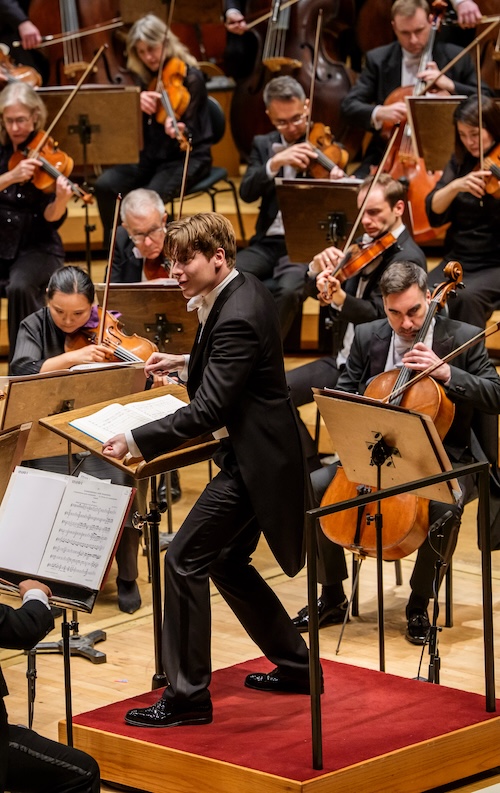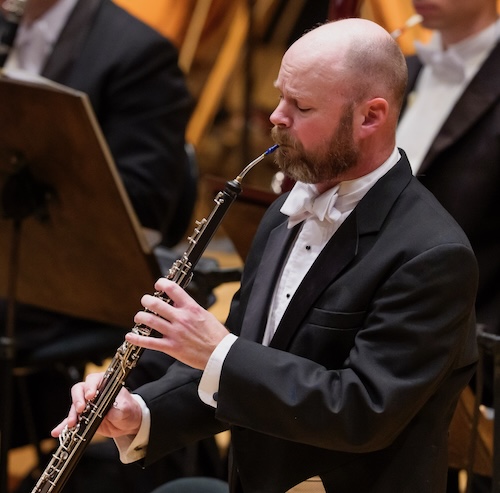Performances
Fischer, Budapest Festival Orchestra deliver a deep, eloquent Mahler Third to remember
No one ever accused Gustav Mahler of taking the easy route. […]
Light, warmth and mastery from Andsnes at Carnegie Hall
Tuesday night was frigid but there was ample warmth in Carnegie […]
Orquesta Sinfónica de Minería serves up a lively evening in West Palm Beach
The trumpet virtuoso Pacho Flores, a product of Venezuela’s famous El […]
Concert review
With luminous Sibelius and rousing Strauss, Mäkelä and Chicago Symphony prepare to take it on the road

A pair of contrasted heroes made up the Chicago Symphony Orchestra’s program Thursday night with Klaus Mäkelä returning to lead two epic works scored for large orchestral forces.
Beyond the challenging works themselves, the program proved notable in other respects. Theodore Thomas and the CSO gave the U.S. premieres of Richard Strauss’s Ein Heldenleben in 1900 as well as the two best-known sections of Jean Sibelius’s Lemminkäinen the following year.
On the current-events side, the program is significant since Mäkelä will take it on the road to Carnegie Hall next week as part of his first CSO tour. The other mostly East Coast dates (Ann Arbor, Washington and Boston) will offer Beethoven’s Symphony No. 7 and Berlioz’s Symphonie fantastique, both of which the CSO’s music director designate led in local concerts last year.
Strauss’s autobiographical tone poem may be the flashier of the two pieces but most interest centered on Sibelius’s Lemminkäinen (aka Four Legends)—the most generous slice Mäkelä has served up in Chicago to date of his great Finnish compatriot. (The conductor’s ambitious recording debut was a complete set of Sibelius symphonies with the Oslo Philharmonic.)
Composed from 1893-96, Lemminkäinen predates all of Sibelius’s numbered symphonies. At 50 minutes it is longer than any of the composer’s other works save his even earlier vocal symphony Kullervo. Lemminkäinen is a sprawling four-part tone poem, inspired by mythic tales from the Kalevala, the Finnish national epic, here concentrated on the often surreal adventures of Lemminkäinen, the titular hero.
Lemminkäinen is not unified enough to be called a symphony and the titles of each section are more suggestive than directly programmatic a la Strauss. Yet the work is richly redolent of the Finnish composer’s mature style and atmospheric in its allusive mystery, gnarled brass bursts, luminous wind writing, running ostinatos and sense of epic grandeur imbued with a Northern sensibility.
“The Swan of Tuonela” is the most celebrated section and usually performed by itself, as was the case with Mäkelä’s sophomore CSO appearance in 2023. On Thursday the conductor set a spacious air of dark mystery in the opening passage for muted strings. English horn Scott Hostetler, performing standing, floated a mesmerizing depiction of the title swan gliding on the black river of Hades, his elegiac eloquence given an equally fine assist by principal cellist John Sharp.

“Lemminkäinen’s Return,” made an effective finale, the hero’s triumphant return manifest in the running figures and brass punctuations, building to a rousing, cataclysmic coda.
Yet the most striking moments came in the longer first and third sections where Mäkelä created a spacious canvas for Sibelius’s moody meditations.
In “Lemminkäinen and the Maidens of Saari” Mäkelä established an arresting atmospheric landscape, accented by William Welter’s searching oboe solo. Following a playful passage for winds reflecting the hero’s amorous adventures, Mäkelä built the ebb and flow inexorably to a shimmering climax. Likewise in “Lemminkäinen in Tuonela” the concentration and acute balancing was most impressive over the 17-minute span, from the opening ominous rustle of lower strings through the austere wind writing and abrupt brass bursts over a rolling bass drum. Beautiful playing by all including guest principal flute Herman van Kogelenberg from the Munich Philharmonic.
This was first-class Sibelius with powerful and sympathetic playing from the musicians in repertoire they infrequently perform. One looks forward to a complete cycle of Sibelius symphonies in a future Mäkelä season.
Richard Strauss‘s Ein Heldenleben (A Hero’s Life) has come in for much stick over the past century-and-a-quarter from those who bristle at the composer’s conceit of setting himself as the hero of his own tone poem—at age 34, no less.
Yet for all its personal inspiration, Strauss doesn’t take this quasi-autobiography all that seriously. Regardless, his music is magnificent, with whipcrack writing for huge orchestra scored with ingenuity and imbued with ceaseless forward momentum.
The CSO‘s Strauss has been legendary virtually from its founding—Fritz Reiner’s 1954 Heldenleben recording is still unequaled—and Mäkelä led a robust and idiomatic performance that was squarely in the full-blooded local Strauss tradition.
From the blast of the beefy opening statement, the Hero’s striding theme went with brisk confidence and ample swagger. Strauss’s filleting of contemporary Viennese music critics (“The hero’s adversaries”) remains the most withering takedown in music history; the high winds colorfully painted his detractors as wheedling pipsqueaks, with the pompous mutterings of Dr. Dehring’s name in the tubas (“Dok-tor-Deh-ring”) making equally witty impact.
One would have liked richer violin tone for the depiction of Strauss’s wife, soprano Pauline de Ahna, than Robert Chen delivered Thursday night. Still, the CSO concertmaster’s playing was unerringly polished and surely put across the querulous nature of Strauss’s formidable spouse.
Mäkelä refrained from going over the top in the hero’s satirical mock-battle with his critics. Amid the off-kilter brass fanfares and alarums, the transparency was impressive with multiple lines clear even in Strauss’s most massive and cacophonous moments.
The “hero’s works of peace” proved most effective with passing, elliptical fragments of nearly thirty Strauss compositions in writing of extraordinary contrapuntal legerdemain. The famous horn theme from Don Juan was less than clarion on this occasion yet the Don Quixote passages were especially lovely, and the quotations floated by gently as if in a half-remembered dream.
The symbolic duetted passage near the end between solo horn and violin managed to achieve the requisite sense of elevated repose, marred slightly by a horn burble on the final tutti chord.
Yet overall the evening’s performances were rousing, supremely well played, and directed with striking skill and sensitivity by the CSO’s maestro-in-waiting. It’s unfortunate that this rewarding and offbeat program is only being played once on tour but those in other cities will have to be content with music of Beethoven and Berlioz to experience Chicago’s new and notable musical partnership.
The program will be repeated 7:30 p.m. Saturday and 8 p.m. February 25 at Carnegie Hall in New York. cso.org; carnegiehall.org
Articles
No slowing down for Gerard Schwarz, South Florida’s busiest conductor
When Gerard Schwarz was a teenage trumpet student, he dreamed of […]
Opera creators find the light of love amid the horror of “The Shining”
In their adaptation of Stephen King’s iconic 1977 novel The Shining, composer […]
News
Patrick Quigley to depart Seraphic Fire in 2026; James Bass will be his successor
The Seraphic Fire torch is being passed. Patrick Dupre Quigley, founder […]
Subscribe
![]() Subscribe via RSS
Subscribe via RSS
![]() Follow on Twitter
Follow on Twitter